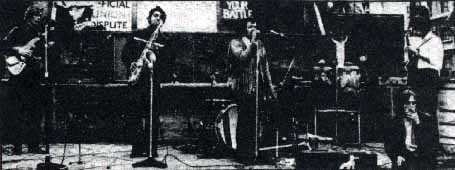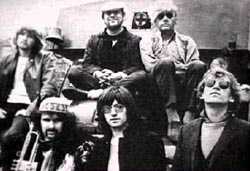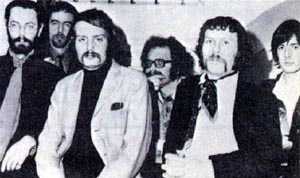1968 - 1970 | |
| 1968 |
In the spring, Spedding joined an early blues-based rock band, 'Denis Couldry and Smile' (a couple of the guys eventually played in Matthews Southern comfort), which played at the Isle Of Wight Festival in August - the only gig they ever did. This gig was aired on TV. They also did a TV appearance in Manchester, and put out a single. You can hear his playing on their second single "Penny For The Wind" out in May 1968. Spedding also plays violin.
 Pete Brown & his Battered Ornaments seem to have recorded their debut single and the first album in the end of this year or in the early of 1969. While Spedding worked with Pete Brown &: his Battered Ornaments, he joined the Frank Ricotti Quartet in August. They recorded an album later that year, earlier than the recording with Pete Brown & his Battered Ornaments, which was put out the following year. This is the first recordthe first record which he ever made. |
| 1969 March 14 |
Pete Brown & his Battered Ornaments toured in UK and finally issued their debut single, The Week Looked Good On Paper / Morning Call on Parlophone. They signed to EMI's new progressive label Harvest, established by Malcolm Jones. |
| June |  Pete Brown & his Battered Ornaments issued the first album. Pete Brown says;
Pete Brown & his Battered Ornaments issued the first album. Pete Brown says;The tracks on the album are early efforts and they are a bit primitive. When I first heard them I had the horrors, but after a few listens it strikes me as being quite entertaining. It's funny and serious. It seems to have a sense of humour running all the way through it. It's about 50 minutes long, so it's good value. There are a few mistakes. The voices is a bit off but the boys play well. I've learned a lot from them. Everyone plays fantastically on it, it's very loose and there's a lot of improvisation. The first six months, we weren't making much. We got a strange reaction because we found that there weren't many groups around that improvise. Most group have arrangements followed by solos. We play all the time. There aren't many solos - and a lot of people were worried by that - but they realized we were entertaining and we're serious about what we are doing, altough we may get on stage and laugh and joke and make insane comments. The songs we do are quite sophiscated and not obviously commercial. They are really an extension of what I was doing in my poetry. People want to label you desperately but they can't label us. Now we just say we are a rock group. The second album has a much stronger group feel. The first LP sounds like a lot of people digging each other and it's happening. We seem to know what we want to now, and it just remains to convice the population of England. They really started recording their second album by June and made a TV appearance on 'Free For All'. But Pete Brown was kicked off by other members in June. He was in the band when we recorded the backing tracks. And then he started doing the vocals. The vocals were so bad, so terrible. so we fired him. Nobody else in the band sings. So I sang. And it's in the wrong key for me, too high for me. But I sang anyway because I knew if I didn't sing on those tracks, the record wouldn't come out. I never sang before. First time I ever sang was in the studio on that album. So I started singing and writing songs, because I had to. Pete Brown recalls; The Battered Ornaments was a terrible apprenticeship for me. There were a lot of incredible musicians there, and I just couldn't accept the responsibility of leadership. They were going so far into jazz. A few bands have done that, like Colosseum, and they'll start there - but they've never gone too far outside jazz either. That was an unreliable band with a lot of bad vibes, which very rarely gave a good performance. It was also very difficult to sing with, because everyone seemed to be in the front line and freaking out. In this month, Spedding recorded with Jack Bruce for his first solo album. It doesn't mean to say that I enjoyed it, because I was a bit in the dark. I was very overwhelmed by the fact I was doing it, but to be quite honest I didn't actually enjoy it all that much, because I was very scared, pretty frightened that I was in such a big scene, and I had no experience of recording that sort of thing at all. I hadn't got my sound together or anything properly. I suppose he liked what I was doing and I was able to do it well enough and I was receptive to what he wanted to do. |
| July 5 | Hyde Park Concert This famous concert was the Rolling Stones' first show after Brian Jones' death. The Battered Ornaments, Third Ear Band, King Crimson, Alex Korner were amongst the performers. The Battered Ornaments played just before the Stones. Spedding had to play with two fingers and use a bottle neck, because he had broken his left wrist in a horse-riding fall. The Ornaments have a funny story - and most people misunderstand us completely. We're the only group I know consisting of people who have absolutely no experimenting with rock groups. So we're going to do when we go on the stand. This can backfire a bit, like it did in Germany a few weeks ago (the summer of 1969) when we became the only group ever to be sacked from the Star Club in Humberg. They're trying to be more progressive over there now, so we started by playing a half-hour set of pure noise. That stunned them a bit so in the second set we played all the most commercial things we could think of. After I'd finished singing 'Sweet Little Sixteen' the manager came up and told me I'd got the words wrong, and we were sacked at the end of the week. We have a lot of trouble with recording, though, because we're not big enough to be able to take a studio for a solid week. We have to be fitted in between the big names. this makes it difficult for us because we progress musically so fast that we change in the gaps between session, and we always want to start everything all over again once we get into the studio. The Battered Ornaments had some gigs in UK in the summer/autumn, Spedding started playing with Mike Westbrook by August, also played with Frank Ricotti. And he joined Nucleus in the winter. As the Battered Ornaments we had already split from Pete Brown and we were going out as the Battered Ornaments with me singing, doing my own songs and I started playing a lot with Frank Ricotti and we played with lots and lots of different bands. Gigs and sessions, it was all boiling over and whatever seemed to be the best thing to do I just followed it. There was a period of three or four months when I was playing with about dozen bands. I was playing with the frank Ricotti Quartet, Mike Gibbs, Mike Westbrook. I even had a stint with McGuiness flint before they were actually called McGuiness Flint. They were looking for a guitar player and I just went along, and they wanted me to ditch everything else and I said I didn't want to do that and so I split from them. In December, the Battered Ornaments released Mantle-Piece. I don't think some of the experiments succeeded. But it might be interesting to a listener, but not to me. I could have done better. It was an experimental group, we don't care. We just played anything. It was quite anarchistic group. We don't care if we broke a string, and I don't care if I broke my arms. I just wanted to play anyway. Really young and stupid. |
| December 15 |
Nucleus with Spedding debut (?) at the 100 Club in Lodon
|
| 1970 |
|
| January 5 | Nucleus gig at Ronnie Scott's. And they recorded their first album in this month. On 15th, Mike Gibbs played at the London School of Economics. Spedding and Ray Russell on guitars, Jack Bruce on bass, together with Henry Lowther, Chris Pyne, Alan Skidmore and John Marshall also played together. |
| February |
Spedding won the second place of the Best Jazz Guitarist in Melody Maker's Readers Poll.
On 27th, Spedding issued his first solo single Rock'n'Roll Band / The Battered Ornaments - Goodbye We Love You |
| March | Songs Without Words seems to have been recorded
by the end of this month, but has never been put out anywhere except in Japan.
It is said that only two test pressings (one-sided 2-LP set, white plain cover) were made,
one was for Spedding and another was for Malcolm Jones of Harvest. This catalogue number is SHVL 776. Spedding solo show on March 23rd at the 100 Club was advertised. |
| June 19 | Nucleus played Montreux Jazz Festival. |
| July |
Spedding spent one week recording his first album
Backwood Prodression.. All I can remember is that it was recorded at Abbey Road, it was after the Beatles broke up. And I think George Harrison was recording All Things Must Pass, and we used the studio, it was set up harmonial thing and keyboard they used on the album. And Geroge Harrison was taking holiday, he was taking a few days off. I was told not to touch anything. And I set my instruments along the side and record the album. And they said 'Don't come tomorrow, because George Harrison comes in tomorrow'. Spedding worked with Phil Spector around this period, but nothing was released. Nucleus went to the US to appear at the Newport Jazz Festival. |
| September |
Nucleus recorded their second album. Ian Carr had formed another band called Solar Plexus and played some dates. He issued an album called Solar Plexus in 1971. Spedding began recording with Gilbert O'Sullivan. |
| July | Backwood Progression
was issued. What comes out of any musician is the product of what goes in, and I was very hung up on that kind of music for a long time before the album was made. Last spring, I saw Bob Dylan and the Band at the Isle Of Wight, and I sat around for a long time taking it in. I was playing mostly avant-garde style music, having been asked to do it and being interested in the random sounds thing, and probably as a reaction against that I started listening to the kind of music I'd started off by playing. I'd come full circle, just as the rock scene itself had come full circle. I have got to have the courage of my own convictions. Bob Dylan copied Woody Guthrie to start with, and he had the courage of his convictions. Robbie Robertson, who I think is a fantastic player, is a copy of James Burton. Elvis was a cross between Crudup and Perkins, but he was also Elvis. Everyone's a copy, but with all their own idiosyncracies. That's what it's all about, and I'm a great believer in tradition in music. Take Dylan's 'Girl From The North Country' and Paul Simon's 'Scarborough Fair', and you'll find Simon pinched a line from Dylan. But look back a little further and you'll find that Dylan pinched the line from a really old folk song. That's not plundering - it's a feeling for tradition which I share. In the album I tried to find words and progressions which flow along without sounding harsh. It's a folk tradition really, which I've been interested in since I first heard Lonnie Donegan. I've no vocal technique to make me sing like Martha Reeves or somebody, so that department will still sound like second-rate Dylan I don't copy him... it's just a fact that neither of us can sing properly, so we sound alike. I'm experimenting and feeling around, but when I do say something with a song it's really something I really want to say. I'm not about to knock myself out in the quest to creat something original. I went through that the Battered Ornaments, when everyone was trying to be as freaky as possible and ended up sounding like Schonberg gone mad. That's when you have to own up and rediscover the reasons why you started playing, and realize that's a period of immaturity which some people never got out of. I've been through all the scenes that an electric guitar player can go through. I've played sound effects, bebop, skiffle, rock and roll, Wes Montgomery, and random music, and I've sorted out what I want to play. |
| November |
Gilbert O'Sullivan released Nothing Rhymed. I listened very hard to it, but I couldn't hear the guitar at all. But about two years later it was red carpet treatment when I came into the studio for a Gilbert O'Sullivan session, and I remember staying behind afterwards and doing a lot of overdubs on guitar. Ian Carr talks about Nucleus. At the moment what we're playing is virtually free music. After working together for a few months, you reach the point where that's possible, but you can't do it for ever. Sooner or later we'll reach a peak, and then we'll have to stop, go back to thebeginning, and start on something else. The process of acquiring freedom lasted about six months with this band, and we're at an incredibly high level right now. I'm doing what I really want to do. I rate the musicians more highly than you do, for instance, Karl Jenkins' piano-playing is incredible, he's got a fantastic ear and a great sence of time, and his harmonic conception is wonderful. Very few people in this country seem to value John Marshall for what he is. When he came into the band I had to make him believe in himself, and now he's got terrific confidence. Jeff's got great ears, too. It's taken him some time to master the electric bass, but in the past month he's come through into another demension. And Chris Spedding...hw comes up with new things all the time. Everybody thinks of Brian Smith as a competent happy-goluckey blower, but he's got a great imagination and his playing gets better and better. For me, the test of any band is how much I enjoy listening to it when I'm not playing. With Nucleus I get into a state approaching ecstasy. Nobody's afraid to make the first statement. I've got a theory that if you're doing something that excites you personally very much, then it's bound to get through to other people as well. If you're not excited by it, you might as well pack up. |
| 1944-1967 / biography / 1971-1972 |
